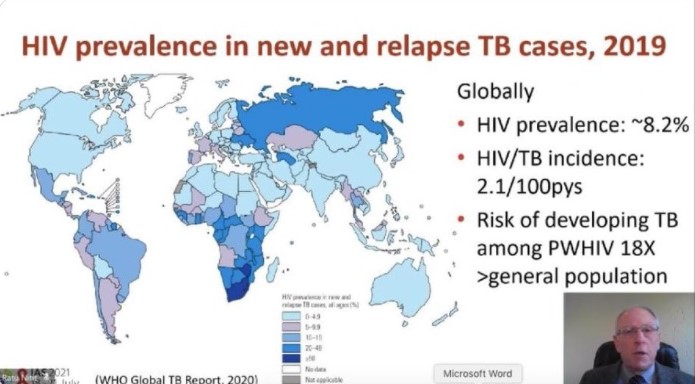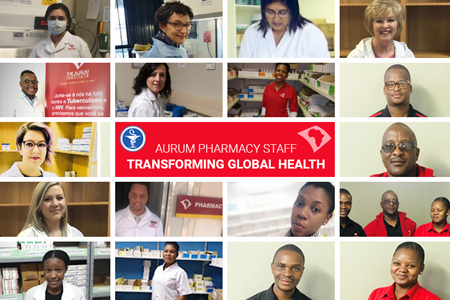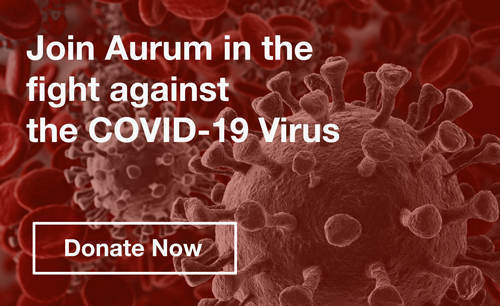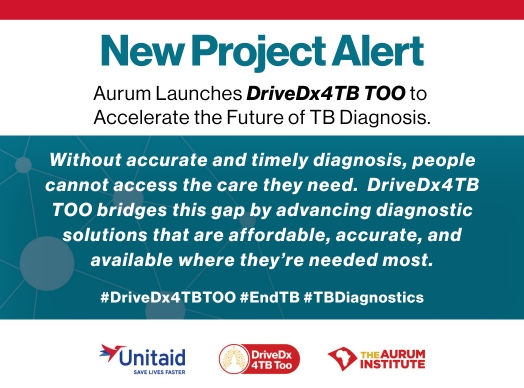Aurum experts recently presented at the 11th International Aids Society (IAS) Conference, which brought together thousands of HIV professionals virtually from 18 to 21 July.
On the opening day of the IAS conference, Professor Gavin Churchyard, Aurum Group CEO, presented on the current state of the TB/HI V epidemic in a symposium on advances in TB and HIV diagnostics and treatment.
Sub-Saharan Africa carries the greatest burden of HIV associated TB. Although HIV is associated with an increased risk of TB, globally TB deaths amongst HIV positive people declined 69% and in Africa by 76%.
“The reduction of TB cases and deaths is due to the expansion of TB and HIV prevention and care services especially antiretroviral therapy (ART)… In high HIV prevalent settings, scaling up ART and TB preventive services to people with HIV contributes to population level TB control,” said Churchyard.
His presentation looked at the general population as well as key populations including pregnant women and adolescents.
Attending the @ias_conference? Don't miss this symposium #TB
— The Aurum Institute (@Auruminstitute) July 18, 2021
& #HIV. Aurum Group CEO Prof Gavin Churchyard will be presenting on the current state of TB/HIV epidemic. pic.twitter.com/bNiYIOlE3n
Adolescent girls and young women (AGYW) were also the focus of an abstract co-authored by Aurum’s Dr Pearl Selepe, Clinical Research Site Leader: Klerksdorp and Marthinette Taljaard, Head of Department: Quality Assurance. Dr Nelly Mugo from the Kenya Medical Research Institute was also a co-author on the abstract titled: HPV increases HIV risk in African women: advancing the argument for HPV immunization. Mugo was the first recipient of the Gita Ramjee Prize presented at the the virtual HIV Research for Prevention Conference (HIVR4P) on 28 January 2021. The prize was established by established by Aurum in collaboration with the IAS and recognises leading female scientists in the field of HIV prevention research, who demonstrate the principles and practices Aurum’s late Chief Scientific Officer Professor Gita Ramjee, embodied in her life and career.
AGYW account for 25% of incident HIV infections in sub-Saharan Africa. Human papillomavirus (HPV) infection is common among AGYW, but its role in HIV acquisition is uncertain. The study evaluated the relationship between HPV and HIV acquisition. It found that HPV infection was associated with HIV acquisition among AGYW living in high HIV burden settings. Infection with a 9-valent HPV vaccine-targeted type is prevalent in this population. In addition to preventing HPV-associated cancers, increasing HPV vaccination coverage may reduce new HIV infections in sub-Saharan Africa.
Gavin Churchyard from Aurum Institute, South Africa in his presentation for #IAS2021 said that globally HIV assosiated TB incidence and deaths are declining more rapidly than HIV-negative TB and deaths. But ART reduce the risk of TB and doesnt increase infectiousnes pic.twitter.com/gema5jXJQo
— Yayasan KNCV Indonesia (@YKI4TBC) July 18, 2021
Dr Tonderai Mabuto, Aurum’s Director: HIV Research presented an abstract titled: Uptake of a rapid HIV point-of-care diagnostic test with shorter result turnaround to increase the reach of HIV testing services in public sector clinics, South Africa. It sought to describe the uptake of INSTI-POC by clinic-based HIV testing service providers in a high HIV prevalence district in South Africa. The study found that the lengthy result turnaround times for HIV rapid diagnostic tests are a bottleneck to increasing the reach of HIV testing services. This often results in patients declining testing services or providers reading test results before the recommended time in order to meet daily testing targets.
“Aurum grounds its work in evidence – the advocacy process to implement the project was made easier by the fact that we showed our stakeholders the data on where the gaps were, and how this innovation could address the gaps.” said Mabuto.
The findings suggest high acceptability of HIV rapid diagnostic tests (RDTs) with faster turnaround times. This suggests several possibilities for increasing HIV testing services (HTS) reach through gains in productivity of and acceptability with patients. Further work is required to quantify the effectiveness of INSTI-POC in increasing HTS reach for specific target groups and linkage to appropriate HIV prevention and treatment programmes.
The paper was co-authored by the following Aurum staff members: Prof Geoffrey Setswe, Managing Director: Implementation Research Division; Dr Dino Rech, Group Strategy and Business Development Officer; Dr Ntombifikile Mtshali, Managing Director: Health Systems Division; Nolundi Mshweshwe-Pakela, Junior Research Manager: Cebisile Hlophe, Study Coordinator; Dikeledi Tsukudu, former Senior Programme Manager; Nosimilo Zama, Senior Programme Manager; Prof Dave Clark, Group Chief Operating Officer / Chief Executive Officer: Southern Africa.














